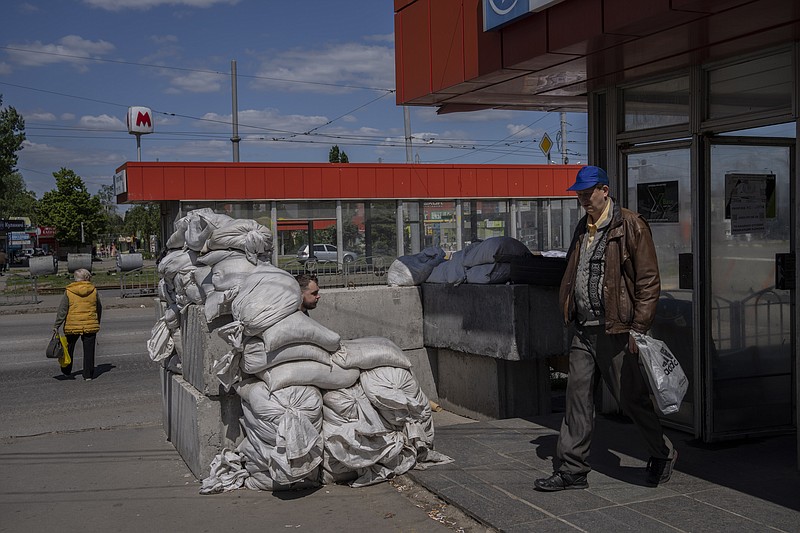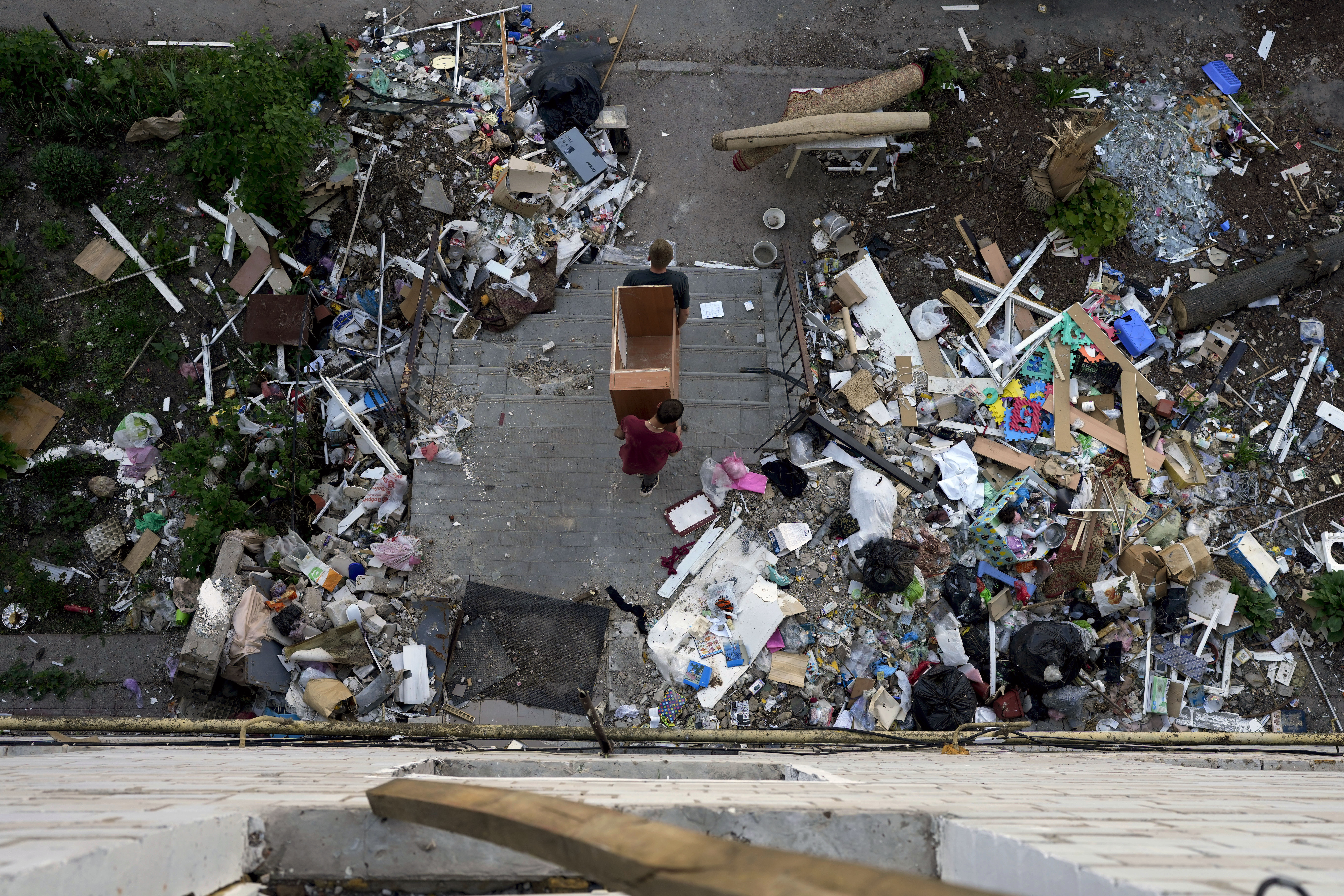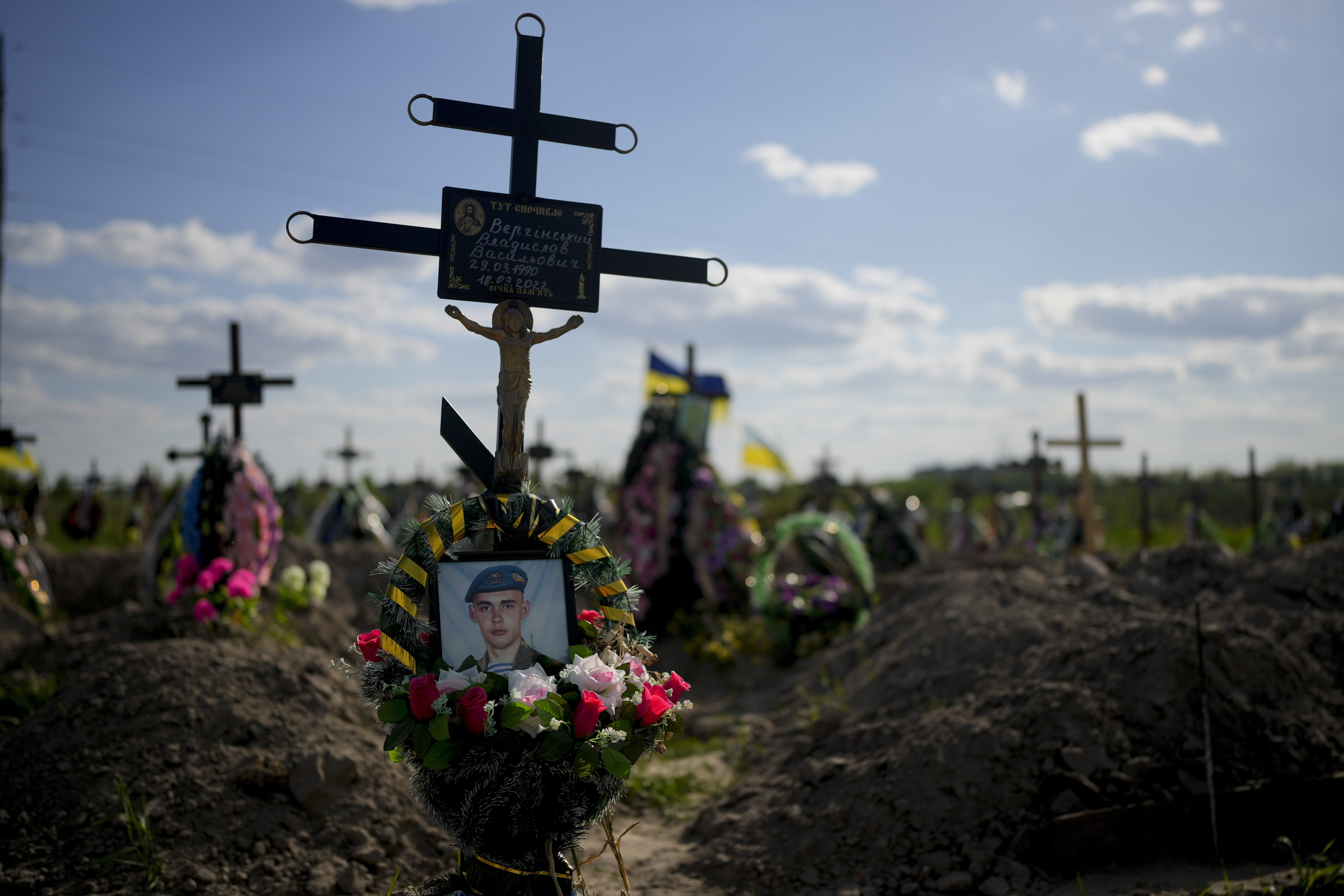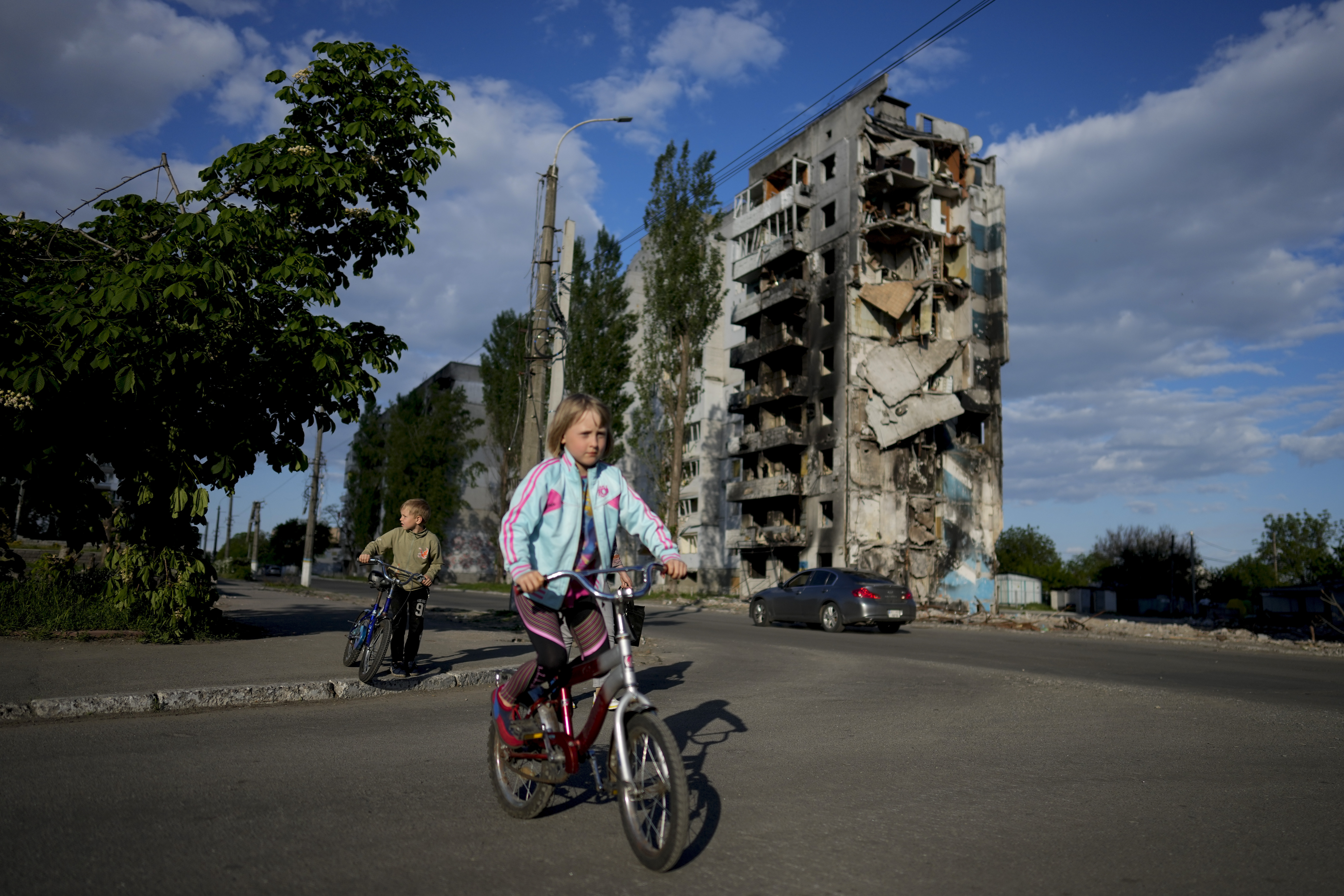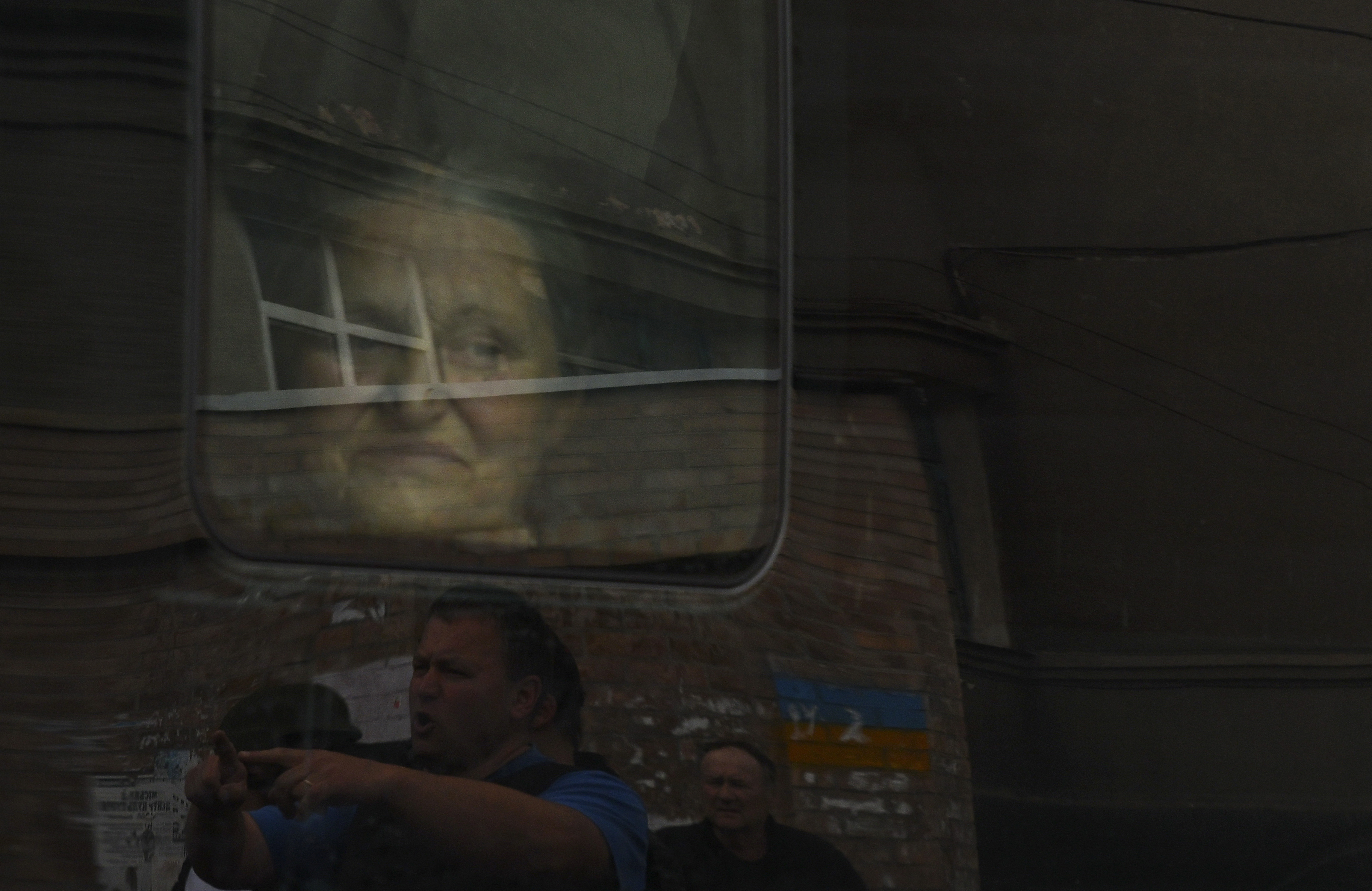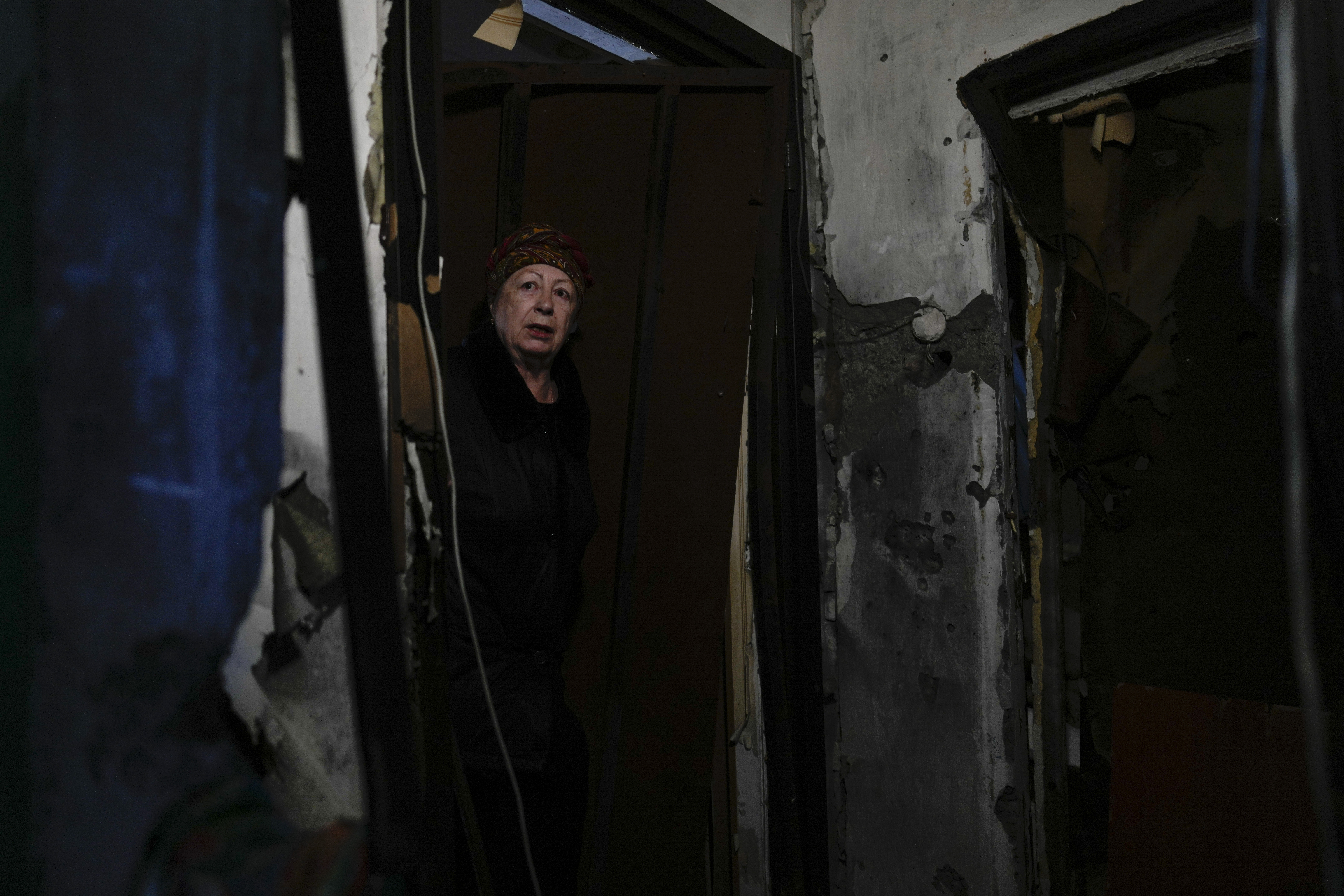KYIV, Ukraine -- Workers digging through the rubble of an apartment building in Mariupol found 200 bodies in the basement, Ukrainian authorities said Tuesday.
The bodies were decomposing and the stench hung over the neighborhood, said Petro Andryushchenko, an adviser to the mayor. He did not say when they were discovered.
Mariupol was pounded during a siege that ended last week after some 2,500 Ukrainian fighters abandoned a steel plant where they had made their stand. Russian forces already held the rest of the city, where an estimated 100,000 people remain, many of them trapped during the encirclement with little food, water, heat or electricity.
At least 21,000 people were killed in the siege, according to Ukrainian authorities, who have accused Russia of trying to cover up the carnage by bringing in mobile cremation equipment and burying the dead in mass graves.
During the assault on Mariupol, Russian airstrikes hit a maternity hospital and a theater where civilians were taking shelter. An Associated Press investigation found that close to 600 people died in the theater attack, double the figure estimated by Ukrainian authorities.
Ukrainian President Volodymyr Zelenskyy accused the Russians of waging "total war" and seeking to inflict as much death and destruction as possible on his country.
Moscow-backed separatists have fought Ukrainian forces in the Donbas region for eight years and hold large swaths of territory. Sievierodonetsk and neighboring cities are the only part of the Donbas' Luhansk region still under Ukrainian government control.
Russian forces have achieved "some localized successes" despite strong Ukrainian resistance along dug-in positions, British military authorities said.
Zelenskyy said Ukrainian forces in the region are facing a difficult situation.
"Practically the full might of the Russian army, whatever they have left, is being thrown at the offensive there," Zelenskyy said late Tuesday in his nightly address to the nation. "Liman, Popasna, Sievierodonetsk, Slaviansk -- the occupiers want to destroy everything there."
Heavy fighting, meanwhile, was reported in the Donbas. Russian troops took over an industrial town that hosts a thermal power station, and intensified efforts to encircle and capture Sievierodonetsk and other cities.
Twelve people were killed by Russian shelling in the Donetsk region of the Donbas, according to the regional governor. And the governor of the Luhansk region of the Donbas said the area is facing its "most difficult time" in the eight years since separatist fighting broke out there.
"The Russians are advancing in all directions at the same time. They brought over an insane number of fighters and equipment," the governor, Serhii Haidai, wrote on Telegram. He added that Luhansk is becoming "like Mariupol."
In the Donetsk region, Moscow's troops took over Svitlodarsk, which hosts a thermal power station and had a prewar population of about 11,000, and raised the Russian flag there.
Serhii Goshko, the head of the local Ukrainian military administration, said armed units were patrolling Svitlodarsk's streets, checking residents' documents.
Russian troops also shelled the eastern city of Slovyansk with cluster munitions, hitting a private building, according to Mayor Vadym Lyakh. He said casualties were avoided because many people had already left their homes and he urged the remaining residents to evacuate west. Heavy fighting was also underway in the city of Lyman.
RUSSIAN SLOWDOWN
Amid the fighting, two top Russian officials appeared to acknowledge that Moscow's advance has been slower than expected, though they vowed the offensive would achieve its goals.
Nikolai Patrushev, secretary of Russia's Security Council. said the Russian government "is not chasing deadlines." And Defense Minister Sergei Shoigu told a meeting of a Russia-led security alliance of former Soviet states that Moscow is deliberately slowing down its offensive to allow residents of encircled cities to evacuate -- though forces have repeatedly hit civilian targets.
Hours later, Zelenskyy mocked Shoigu's assertion.
"Well, after three months of searching for an explanation for why they were unable to break Ukraine in three days, they couldn't think of anything better than to say that's what they planned," he said in his video address.
Russian officials also announced that Moscow's forces had finished clearing mines from the waters off Mariupol and that a safe corridor will open today for the exit of as many as 70 foreign ships from Ukraine's southern coast.
In Kharkiv, there were signs of recovery after weeks of bombardment. Residents formed long lines to receive rations of flour, pasta, sugar and others staples this week. Russia continues to shell the area from afar, Ukrainian officials said Tuesday.
Galina Kolembed, the aid distribution center coordinator, said more people are returning to the city. Kolembed said the center is providing food to over 1,000 people every day, a number that keeps growing.
Meanwhile, the wife of the top commander who held out inside the Azovstal steel mill in Mariupol said Tuesday that she had a brief telephone conversation with her husband, who surrendered to the Russians and was taken prisoner last week.
Kateryna Prokopenko, who is married to Azov Regiment leader Denys Prokopenko, said the call was made possible under an agreement between Ukraine and Russia, mediated by the Red Cross.
Kateryna Prokopenko and Yuliia Fedosiuk, the wife of another soldier, said several families received calls in the past two days. The women said they are hopeful the soldiers will not be tortured and will eventually "come back home."
Denis Pushilin, the leader of the Moscow-backed separatists in the Donetsk region, told the Russian Interfax agency that preparations are underway for a trial of captured Ukrainian soldiers, including the Mariupol defenders.
RUSSIAN DEFAULT EYED
The U.S. will close the last avenue for Russia to pay its billions in debt back to international investors today, making a Russian default on its debts for the first time since the Bolshevik Revolution all but inevitable.
The Treasury Department said in a notification that does not plan to renew the license to allow Russia to keep paying its debtholders through American banks.
Since the first rounds of sanctions, the Treasury Department has given banks a license to process any bond payments from Russia. That window expires at midnight today.
There had already been signs that the Biden administration was unwilling to extend the deadline. At a news conference heading into the Group of Seven finance minister meetings last week in Germany, Treasury Secretary Janet Yellen said the window existed "to allow a period of time for an orderly transition to take place and for investors to be able to sell securities."
"The expectation was that it was time-limited," Yellen said.
FOOD SUPPLIES STRAINED
Fears of a global food crisis are swelling as Russian attacks on Ukraine's ability to produce and export grain have choked off one of the world's breadbaskets, fueling charges that President Vladimir Putin is using food as a powerful new weapon in the war.
World leaders called Tuesday for international action to deliver 20 million tons of grain now trapped in Ukraine, predicting that the alternative could be hunger in some countries and political unrest in others. At the World Economic Forum in Davos, Switzerland, where worries about the war's consequences have eclipsed almost every other issue, speakers reached for apocalyptic language to describe the threat.
"It's a perfect storm within a perfect storm," said David Beasley, executive director of the World Food Program, a U.N. agency. Calling the situation "absolutely critical," he warned, "We will have famines around the world."
The world's food distribution network was already strained by pandemic-related disruptions, and exports from Ukraine, ordinarily among the world's biggest suppliers, have plummeted because of the war. Russia has seized some of the country's Black Sea ports and blockaded the rest, trapping cargo vessels laden with corn, wheat, sunflower seeds, barley and oats.
Russian forces have taken control of some of Ukraine's most productive farmland, destroyed Ukrainian infrastructure that is vital to raising and shipping grain, and littered farm fields with explosives. Ursula von der Leyen, president of the European Union's executive branch, told the political and business leaders gathered in Davos that Russia -- an even bigger exporter -- had confiscated Ukrainian grain stocks and agricultural machinery.
"On top of this," she said, "Russia is now hoarding its own food exports as a form of blackmail, holding back supplies to increase global prices or trading wheat in exchange for political support."
Within Sievierodonetsk, the devastation from Russian artillery is evident on every street in the form of shattered buildings, burned-out vehicles and cratered pavement. Russian pincers approaching the city from the north and south are separated by just 16 miles, but face "strong Ukrainian resistance," the British Defense Ministry said Tuesday.
Officials have offered assurances, without specifics, that the roadblocks will soon be overcome. NATO Secretary-General Jens Stoltenberg said Tuesday that he was confident Sweden and Finland would join the alliance, though "I cannot tell you exactly how and when." Diplomats from the two Nordic countries traveled to Turkey for talks on the issue.
The food crisis took center stage at Davos, where President Andrzej Duda of Poland warned that famine in Africa and elsewhere would prompt a flood of migration to Europe.
Ukraine's agriculture ministry says that the Black Sea blockade has prevented 14 million tons of corn, 7 million tons of wheat and 3 million tons of sunflower seeds from reaching world markets. Ukrainian officials have accused Moscow of stealing Ukraine's produce and then selling it abroad as Russian.
Western officials are circulating proposals for getting grain out of Ukraine, such as having multiple countries send warships to escort cargo ships from Ukrainian ports and run the blockade, but that runs the danger of a shooting confrontation with Russian vessels. Stoltenberg warned that breaking the Black Sea blockade would be very hard.
Ukraine has continued to ship grain overland through Europe, and work is underway to expand such routes, von der Leyen and Slaston said -- but doing so on a scale great enough to replace seagoing shipment would be very difficult.
The Ukrainian Deminers Association, a group that locates and removes explosives, says nearly 45% of the fields it has inspected in the Kyiv and Chernihiv regions were mined.
Even before Russian tanks rolled across Ukraine's border, experts were warning of "a massive surge in food insecurity and the threat of famine," said Adam Tooze, director of the European Institute at Columbia University in New York.
The war, he said, is "impacting an incredibly fragile food system."
Information for this article was contributed by Elena Becatoros, Oleksandr Stashevskyi, Ricardo Mazalan, Yuras Karmanau, Andrea Rosa, Danica Kirka, Ken Sweet, Fatima Hussein and staff members of The Associated Press and by Mark Landler, Matina Stevis-Gridneff, Erika Solomon and Patricia Cohen of The New York Times.
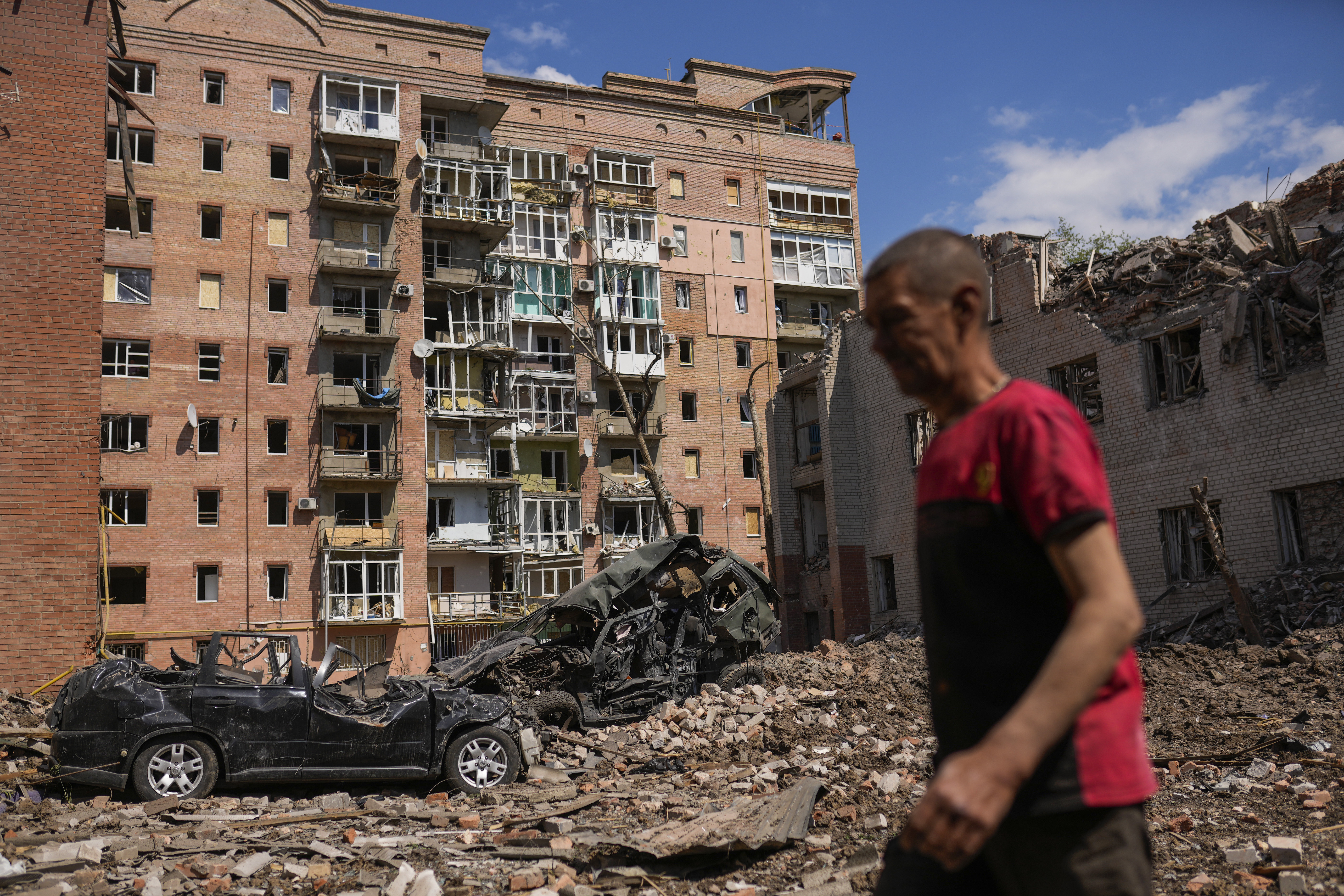 A man walks next to heavily damaged buildings and destroyed cars destroyed in a Russian bombing in Bakhmut, eastern Ukraine, Tuesday, May 24, 2022. The town of Bakhmut has been coming under increasing artillery strikes, particularly over the last week, as Russian forces try to press forward to encircle the city of Sieverodonetsk to the northeast. (AP Photo/Francisco Seco)
A man walks next to heavily damaged buildings and destroyed cars destroyed in a Russian bombing in Bakhmut, eastern Ukraine, Tuesday, May 24, 2022. The town of Bakhmut has been coming under increasing artillery strikes, particularly over the last week, as Russian forces try to press forward to encircle the city of Sieverodonetsk to the northeast. (AP Photo/Francisco Seco) Kateryna Prokopenko, left, wife of Ukrainian commander of the Azov regiment that led the defense of Mariupol, Denys Prokopenko, and Yulia Fedosiuk, wife of Sgt. Arseniy Fedosiuk, talk prior to an interview with The Associated Press in Kyiv, Ukraine, Tuesday, May 24, 2022. Prokopenko and Fedosiuk are among Ukrainian fighters that surrendered to Russian forces in Azovstal steel mill in Mariupol.(AP Photo/Natacha Pisarenko)
Kateryna Prokopenko, left, wife of Ukrainian commander of the Azov regiment that led the defense of Mariupol, Denys Prokopenko, and Yulia Fedosiuk, wife of Sgt. Arseniy Fedosiuk, talk prior to an interview with The Associated Press in Kyiv, Ukraine, Tuesday, May 24, 2022. Prokopenko and Fedosiuk are among Ukrainian fighters that surrendered to Russian forces in Azovstal steel mill in Mariupol.(AP Photo/Natacha Pisarenko)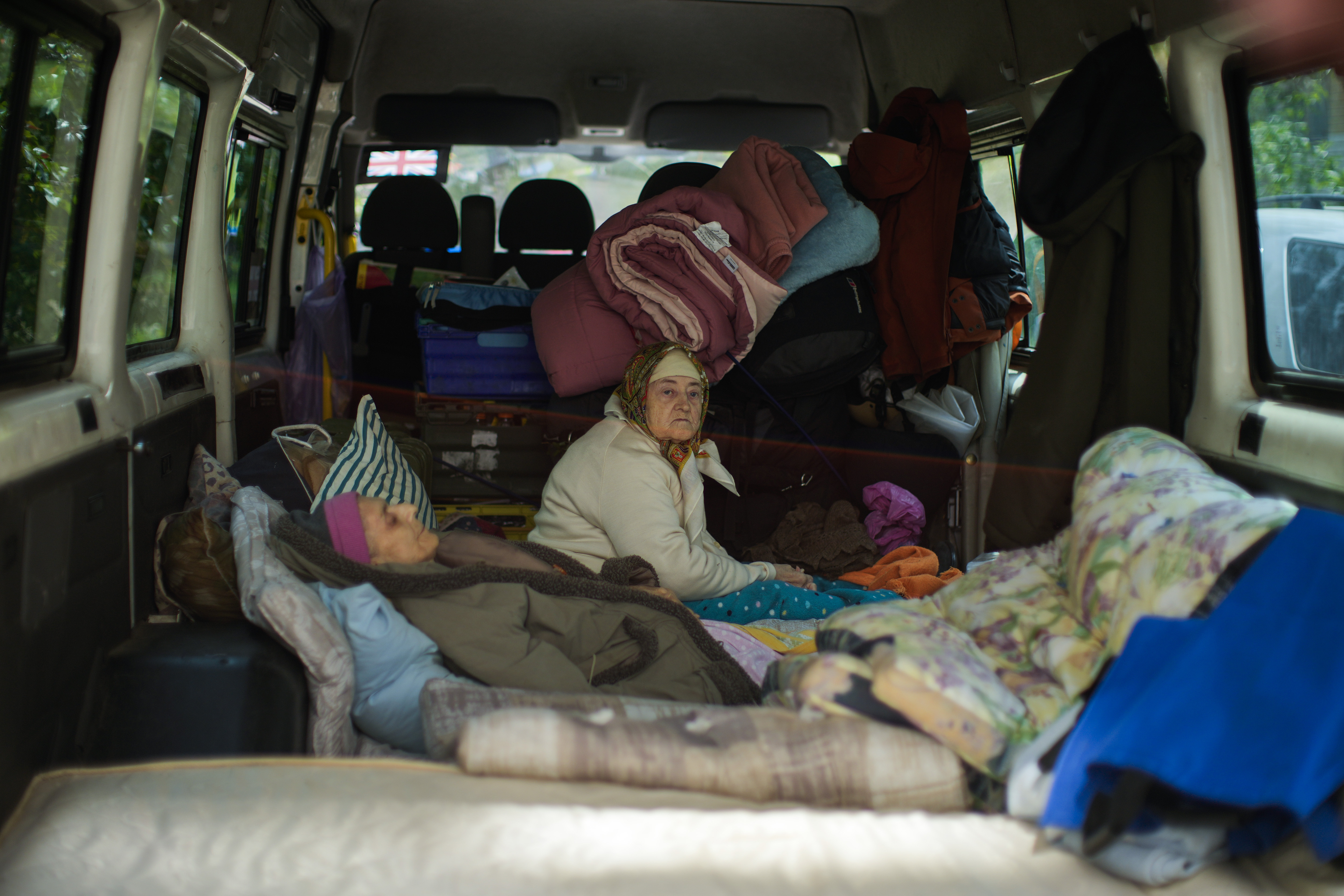 Two women sit inside a van as they are evacuated in Bakhmut, eastern Ukraine, Tuesday, May 24, 2022. The town of Bakhmut has been coming under increasing artillery strikes, particularly over the last week, as Russian forces try to press forward to encircle the city of Sieverodonetsk to the northeast. (AP Photo/Francisco Seco)
Two women sit inside a van as they are evacuated in Bakhmut, eastern Ukraine, Tuesday, May 24, 2022. The town of Bakhmut has been coming under increasing artillery strikes, particularly over the last week, as Russian forces try to press forward to encircle the city of Sieverodonetsk to the northeast. (AP Photo/Francisco Seco) A cat sits on a car in a public park in Bakhmut, eastern Ukraine, Tuesday, May 24, 2022. The town of Bakhmut has been coming under increasing artillery strikes, particularly over the last week, as Russian forces try to press forward to encircle the city of Sieverodonetsk to the northeast. (AP Photo/Francisco Seco)
A cat sits on a car in a public park in Bakhmut, eastern Ukraine, Tuesday, May 24, 2022. The town of Bakhmut has been coming under increasing artillery strikes, particularly over the last week, as Russian forces try to press forward to encircle the city of Sieverodonetsk to the northeast. (AP Photo/Francisco Seco)